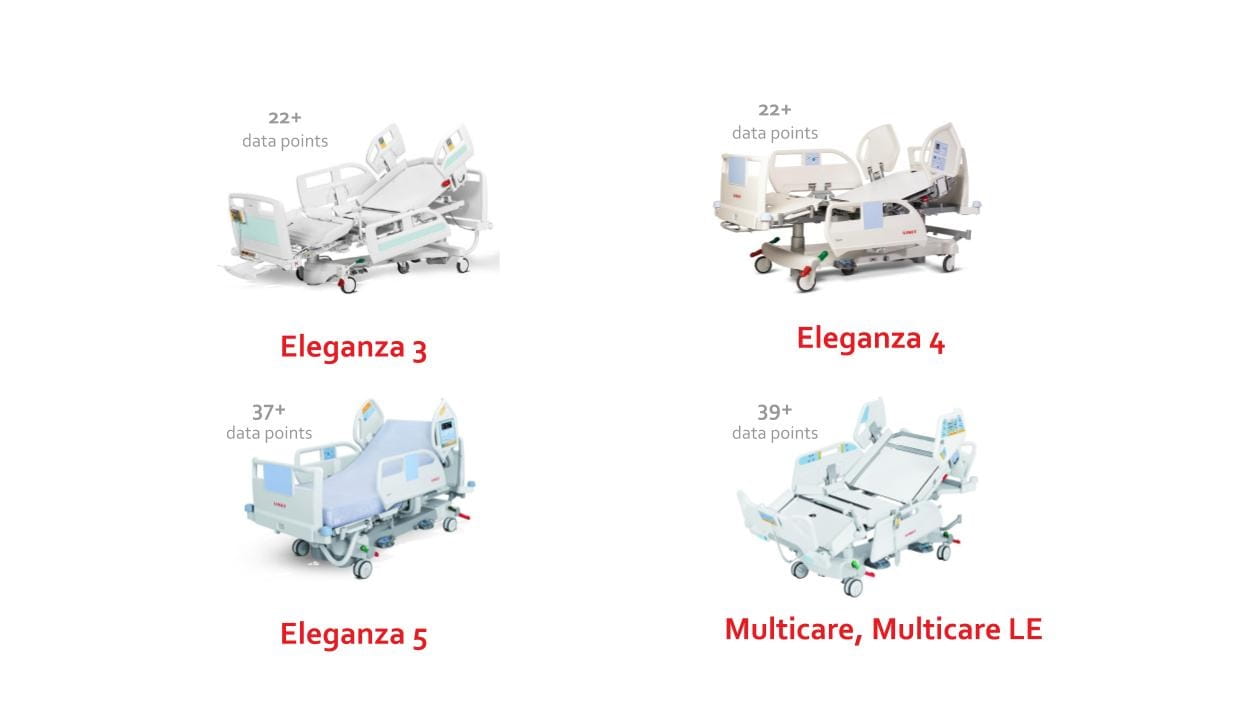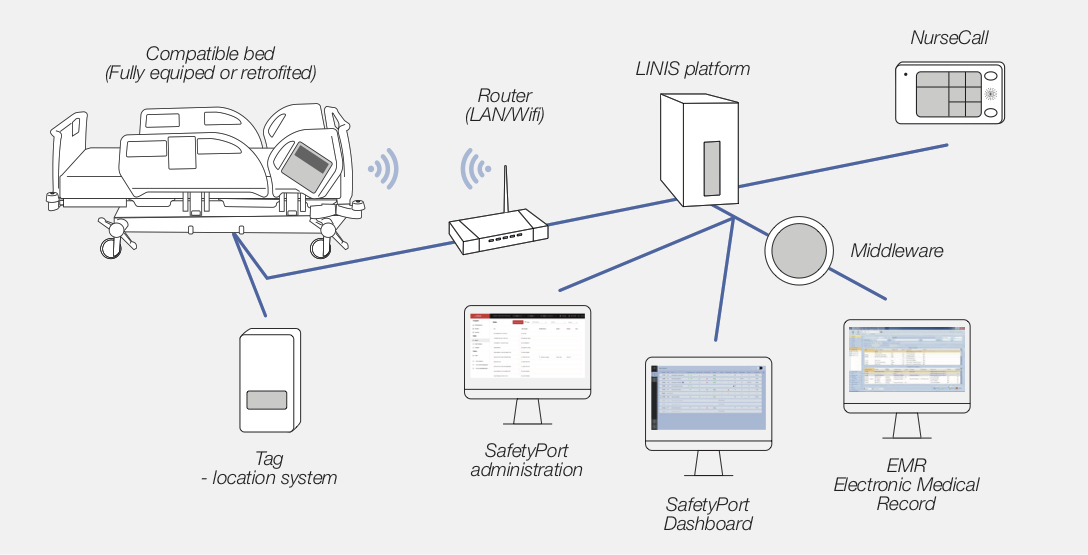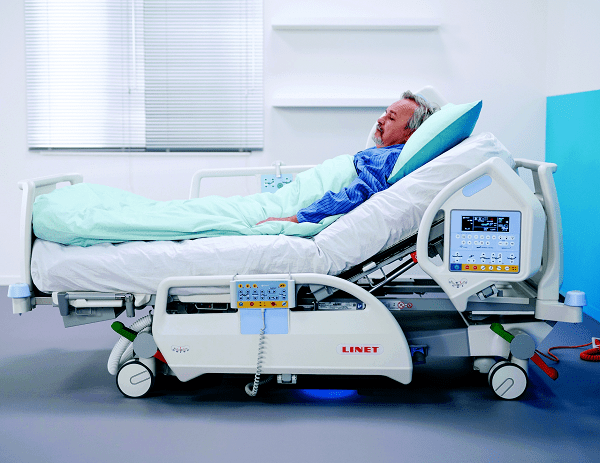Please choose the country
You will be directed to your specific country page

HELPING CONNECT BEDSIDE PRACTICES TO LEADERSHIP STRATEGY TO HELP REDUCE THE RISKS OF CLINICAL PRACTICE VARIATIONS
Being a caregiver is rewarding and challenging at the same time given the amount of multi-tasking that is required. We understand this and are here to assist the caregivers with their workflow by providing LINIS SafetyPort - a solution for automated export of data from LINET beds (e.g. safe position of the bed, bed exit alarm, patient weight).
For more information, download the brochure.
Records from beds can be directly exported to the hospital information system HIS via HL7 v2 standard, so hospital personnel do not have to import them to HIS manually. It helps to easily pair bed data with patient’s HIS data.
Our goal is help modernize the hospital’s infrastructure by supporting electronic record sharing.
Gain Data overview and statistics of how often was a patient mobilized and what types of positioning was used. This data can help you decide your next prevention goals and reduce and manage pressure ulcers and prevent injuries during patient handling.
Gain a large amount of actionable data aggregated in graphs and charts and detailed overview of clinical practice at your facility to have a comparison with department standards.
Gain real time data about the bed usage and control of where the beds are parked, thanks to near real time localization.
LINIS SafetyPort helps to continuously track patients’ weight. Automatically records several care procedures such as using lateral tilt, Trendelenburg position, etc. Saves time of hospital personnel for administrative tasks and improves their workflow. Helps bioengineers and technicians make the logistics of beds operation more efficient and gives them an overview of beds location.
LINIS SafetyPort is HL7 V2 compliant. Compatibility with facility specific EMR, HIS, middleware or software may require additional programming, software, hardware or other elements.
| Patient Safety |
Group of 15 data points including patient's weight, presence and safety position of the bed. |
| Respiratory & Mobilization |
Group of 12 data points helping to prevent respiratory illnesses, improve mobilization practices, prevent pressure injuries and thus jointly contribute to shortening length of stay. |
| Bed Management |
Bed Management is a group of 7 data points monitoring location of bed and important maintenance data providing hospital with overview of its equipment and thus helping to increase efficiency.
|
| Utilization |
Group of 5 data points providing hospital with overview of bed features and its utilization providing actionable data for detailed KPI assessment. |
The system is compatible with Multicare, Multicare LE, Multicare X, Eleganza 3, Eleganza 3 XC, Eleganza 4, and Eleganza 5 beds.

LINIS SafetyPort is HL7 V2 compliant and thus compatible with any 3rd party software using this industry standard. Compatibility with facility specific EMR, HIS, middleware or software may require additional programming, software, hardware or other elements.

| Bed safety position |
Bed is in safety position (side rails up, lowest bed position, backrest at 30° or more, bed breaks on) |
| Trendelenburg angle |
Angles sensor provides information if the foot part of the bed is higher than the head part or opposite |
| Lateral angle position |
Sensor provides information if a bed is tilted on the left or right side |
| Patient weight |
Sensors provide information about patient weight |
| Side rails position |
Sensors provide information if side rails are up or down |
| Backrest 30° |
Sensor provides information if backrest is set at 30° |
| Backrest angle |
Sensor provides information of backrest angle |
| Brakes status |
Sensor provides information if brakes are locked or not |
| Bed exit alarm | Sensor provides information when patient leaves the bed |
| Lowest position of bed |
Sensor provides information if bed is in the lowest position or not |
| Bed exit monitoring |
Sensors provide information if bed exit is activated or not and if zone bed exit is activated |
| Patient on bed |
Sensor monitors patient presence on a bed |
| Location of bed |
Sensor provides information about actual localisation of a bed (Parking site) |
Using integrated bed sensors allows continuous monitoring of the key bed data and its transfer into the HIS.

| Supported interface for the export of data to the hospital IS |
HL7 v2 |
| Bed - server communication |
via Wifi/LAN |
| Wireless |
IEEE 802.11 b/g/n (only 2,4 GHz), WPA/WPA2-PSK, WPA2 Enterprise PEAP-MsCHAPv2, static/dynamic IP address |
| Ethernet |
10/100Base-TX (by IEEE 802.3u) |
| Minimum HW requirements |
Dual-core CPU 3GHz, 4GB RAM, 100GB HDD |
| OS requirements |
Windows and LINUX. LINUX server is preferred. In case of Windows server use 2016, 2019 or later version. |
| Web browser requirements |
Microsoft Edge, Mozilla Firefox, Google Chrome, Opera, Safari |